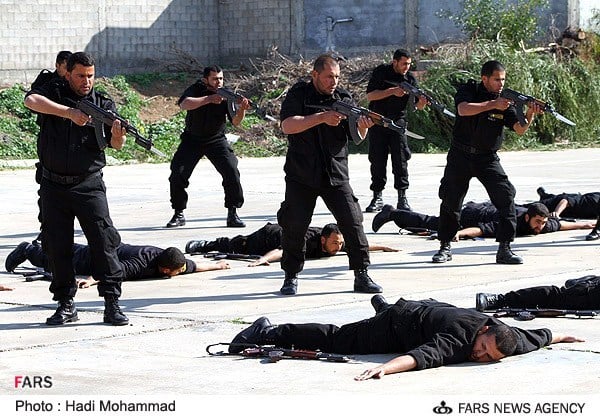By Antonio Graceffo, GATEWAY 17 March 2024

The Palestinian Security Forces (PASF) were founded by the US, UN, and Russia in 1993. They have been funded and trained by the US on and off ever since. Now, the Biden White House wants to boost the PASF through the U.S. State Department. Allegedly, this will contribute to regional stability, as the PASF could coordinate with the Israel Defense Force (IDF). Furthermore, there is some discussion of deploying the PASF into Gaza to maintain order.
Providing weapons, money, and training to the same authority that birthed Hamas and the PLO—what could possibly go wrong?
The Palestinian Security Forces (PASF), also known as the Palestinian National Security Forces (PNSF), began following the establishment of the Palestinian Authority (PA) through the Oslo Accords in 1993. The PASF was originally formed from the bodyguards and security personnel of the Palestine Liberation Organization (PLO). Under Yasser Arafat, the PASF grew into a larger, more formidable force.
After the death of Arafat in 2004, plans were made to rebuild the PASF. The following year, with support from the US, EU, UN, and Russia, Secretary of State Condoleezza Rice announced the creation of the office of the United States Security Coordinator (USSC) for Israel and the Palestinian Authority. The goal was to remake the PASF as a multi-branch force as part of President George W. Bush’s Road Map to Peace.
The PASF consists of four branches: the Presidential Guard (PG), tasked with safeguarding the Palestinian president; the National Security Force (NSF), which ensures area security and aids the Palestinian Civil Police; the Palestinian Civil Police (PCP); and the Civil Defense (CD) directorate, responsible for basic firefighting and emergency response across the West Bank. All of the forces were largely trained by the Americans, with the PG being the only one extensively trained by the USSC.
After Hamas won the 2006 elections in Gaza, continued U.S. funding and training of the troops became more problematic. The situation became even more unstable in 2007 when tensions between Hamas and Fatah, another major Palestinian political party, escalated into violence, leading to a series of clashes between Hamas and Fatah forces in the Gaza Strip. Hamas emerged victorious in these clashes, effectively taking control of the Gaza Strip and ousting Fatah forces loyal to the Palestinian Authority led by President Mahmoud Abbas. This event is commonly referred to as the “Hamas takeover of Gaza” or the “Gaza coup.” It led to a split in Palestinian governance, with Hamas controlling the Gaza Strip while Fatah maintained control over the West Bank.
The Hamas/PLO split makes it very difficult for Gaza and the West Bank to work together, raising questions about how the US would train the security forces of both entities and who those entities would obey. Currently, the PASF exists and has troops in the West Bank, but they are being driven out of some towns by armed groups, and they have not received their salary in months, although the US regularly sends aid money.
One could easily ask why the White House is even trying. Hamas and the PLO have both been dubbed terrorist organizations. Under international law and US law, it is illegal to provide funding, training, and weapons to terrorists.
Not surprisingly, Israeli intelligence discovered that Palestinian Authority security personnel have been involved in terror attacks. According to a report from the Israeli NGO Regavim, 46 members of the Palestinian Authority Security Forces (PASF) lost their lives while engaging in terrorist activities aimed at or attempting to target numerous innocent Israelis. Additionally, 25 individuals were apprehended, and at least seven were injured. These findings suggest systematic wrongdoing within the PA’s ranks. The report goes on to allege that not only does the Palestinian Authority fail to condemn terrorism perpetrated by security force members, but it also celebrates them and provides financial assistance to the terrorists and their families.



Leave a Reply
You must be logged in to post a comment.